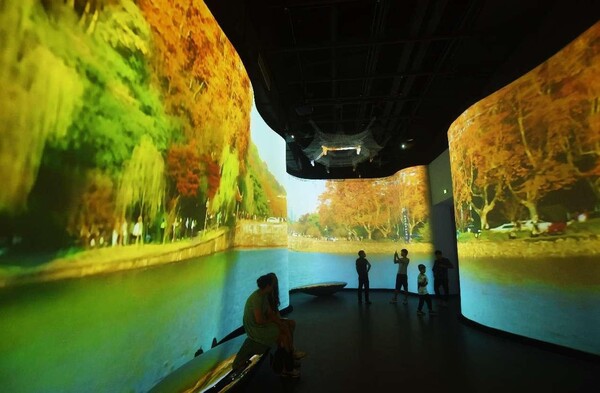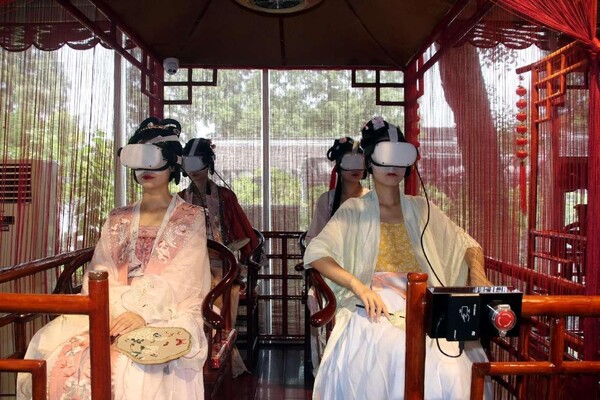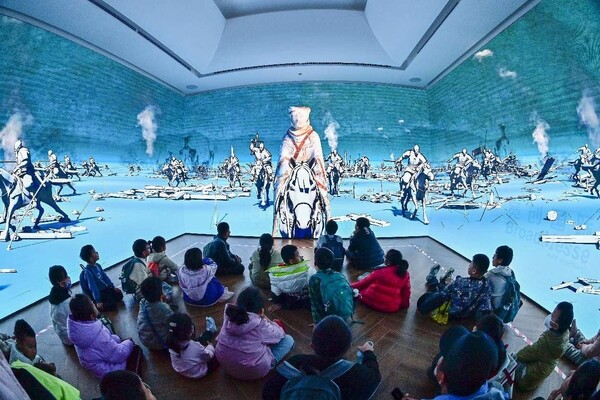By Wang Ke, People's Daily
At the National Museum of Classic Books, an immersive exhibition hall has been launched to present a fascinating journey exploring the past and present of the Yongle Encyclopedia, the largest encyclopedia in ancient China commissioned by the Yongle Emperor of the Ming dynasty(1368-1644).
Based on the history of the Yongle Encyclopedia, this exhibition hall incorporates rich science fiction elements and utilizes digital technology to lead the visitors through different time and space dimensions in history.
With six viewing routes and four story endings that can be chosen by the visitors, the immersive exhibition presents an interesting plot that brings the visitors closer to the charming traditional culture.

Currently, immersive cultural and tourism experiences are favored by Chinese tourists, such as immersive performing arts, immersive night tours, immersive exhibitions, and immersive cultural blocks.
A tourism enhancement plan for the period between 2023 and 2025 issued by China's Ministry of Culture and Tourism in 2023 proposed to accelerate the development of smart tourism and create new immersive and smart tourism experiences and scenes.
An official of China's Ministry of Culture and Tourism noted that immersive and smart tourism spaces use technologies like augmented reality, virtual reality, and artificial intelligence to create interactive experiences for tourists. By combining digital elements with cultural and creative features at destinations like tourist attractions, resorts, museums, and heritage sites, this will produce new tourism products and consumer experiences. The goal is to deeply engage tourists and allow them to interact with these blended virtual and real environments.

Recently, China's National Development and Reform Commission, Ministry of Culture and Tourism, and Ministry of Industry and Information Technology jointly announced the first pilot list on cultivating national new spaces for smart tourism and immersive experience.
Nearly 1/3 of the projects on the list were related to culture and museums, including the Yongle encyclopedia-themed immersive exhibition at the National Museum of Classic Books, the "Magnificence and Grandeur: Immersive Experience of Grotto Art" at the National Museum of China, "The Dreams of Lady Xin Zhui" digital exhibition featuring the restoration of cultural relics unearthed from the Changsha Mawangdui Han Dynasty Tombs, and an immersive smart tourism space initiated by the Dunhuang Academy.
Statistics released by Meituan and Dianping, two Chinese shopping platforms for locally found consumer products and retail services, indicated that "immersive" has become a hot search term and booking for cultural and tourism products over the Spring Festival holiday in major tourism cities like Beijing, Shanghai, Hangzhou and Chengdu.

"The popularity of immersive tourism is driven by efforts on both the supply and demand sides," said Liu Min, a professor at the Tourism College of Beijing Union University.
On the supply side, new technologies like the internet and virtual reality are accelerating their application in the cultural and tourism sector, driving continuous innovation in immersive and smart tourism offerings. On the demand side, tourism consumption shows a clear trend towards personalization and diversification. Tourists have a stronger demand for new cultural and tourism integrated products, providing ample room for innovation and development in culture and tourism.
Lu Mengxi, head of Meituan cultural and tourism research institute, believes that tourism is gradually shifting from rushed sightseeing towards in-depth travel and interactive leisure. Immersive tourism allows people to gain knowledge and appreciate culture through immersive interactions, providing tourists with a brand new experience. This is the main reason behind its continuing popularity.
Experts believe immersive tourism has immense room for development. Cultural and tourism enterprises should keep up with consumer trends and create more diverse, high-quality immersive tourism products to tap the greater potential of cultural and tourism consumption.


